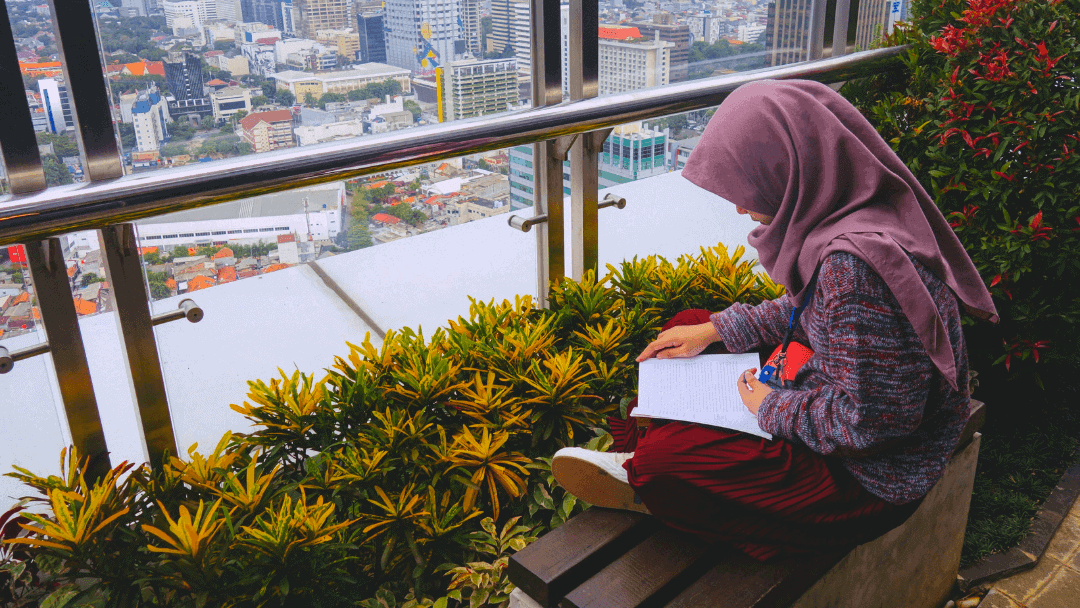The following article is a transcript of the below video of Rational Religion by Anne-Marie Ionescu. Either watch or read — we don’t mind!
The Hijab in the Quran
So what is the “hijab”? The word is commonly used to represent the cloth a Muslim woman covers her hair with. The word “hijab” however is not the term used in the Quran. The word used in the Quran in Chapter 24 is in fact “Khimar” where it instructs women to “draw their head coverings across their chests”. The word “Khimar” comes from the root word “Kha, Mim, Ra,” which, in Arabic, conveys the meaning of a covering. Other words that derive from this root word draw from this basic meaning. For example, while “Khimar” means head covering, “KhAmar” means “alcohol” because it is known to obscure or veil one’s mental faculties. It’s all about covering the head, literally or metaphorically! Those who think that the Quran makes no mention of the head covering should consider this point.
In pre-Islamic Arabia, the “khimar” would be wrapped around the head and its long piece left to drape down the back. The Quran here instructs women to wrap this head-covering in the same way but to drape the long piece to cover their neck and chest. How women fulfil that instruction is how you get the different clothing styles across the Muslim world. If you take that long piece to the front, you get the Burqa, since it covers the face before it reaches the chest. For those who drape the cloth with the upper edge leaving only the eyes, you get the Niqab. And many Muslim women fulfil the instruction as the Prophet himself directed at the basic level, when he said that a woman’s face and hands need not be covered. (Abu Dawood hadith #4104).
Benefits of the Hijab
The question is: why is all this necessary? Why should women dress modestly – isn’t it the role of men to control themselves around women?
The answer, actually, is yes! Modesty has been highlighted for both men and women in the Quran and the Quran actually addresses men first, telling them to lower their gaze around women and to check their sexual impulses. So if that’s what the Quran teaches, why do women need to dress modestly? Islam gives a variety of reasons, the most controversial of which is as a means to reduce unwanted sexual advances. We’ll tackle these reasons in turn.
1) Personal Safety of Women
If we place ourselves in the shoes of a woman looking to live and survive in the real world, then practical advice is always preferential over idealistic advice. Though it would be wonderful to live in a Utopia where no-one drives badly and no-one steals, we all recognise that’s not the world we live in. And so, we wear seat belts and take out insurance. Islam is practical in its advice to women and gives guidance for the real world, not an imaginary one.
The hijab is like a seat belt. Will it prevent you from always being harmed by the reckless actions of others? No. But it can decrease that risk. In the same way, Islam teaches women to take their safety into their own hands, rather than relying on the goodness of men.
Islam, like the seat belt, promotes the safety and wellbeing of its followers.
A well known study conducted by Princeton psychologist Susan Fiske noted that men seeing women dressed in bikini’s activated the part of their brain associated with tools or quote “things you manipulate with your hands” as compared to seeing images of fully dressed women. As famous actress Jessica Rey puts it:
“Modesty isn’t about covering up our bodies because they’re bad, modesty isn’t about hiding ourselves, it’s about revealing our dignity.”
Regarding modest clothing Fiske herself has discussed its impact and the consequences whether knowingly or unknowingly that we perpetuate in today’s culture:
“This is all about the bikini-clad bodies, right? It did not happen for the women who were fully clothed [in the study]. So for us, the moral of the story is that guys looking at women in bikinis—certain thoughts immediately come to mind related to acting on those bodies, and that’s probably why the women are wearing bikinis in the first place. So they’re in some sense objectifying themselves, and that’s people’s prerogative to do that. But it’s important to know the effects of this. So it’s important not to kid yourself about wearing provocative clothes and what you’re provoking.”
Now let’s be clear: modestly dressed women get harassed too. The primary way to eliminate sexual harassment of women is to reform men’s behaviour. An interesting account from the Prophet Muhammad’s life, peace be upon him, illustrates this point. A beautiful woman approached the Prophet for advice on some personal matters. A companion of the Prophet began to stare at her because of her beauty. On noticing this, the Prophet reached his hand backwards and turned the face of his companion away so that he would no longer stare at her. He didn’t criticise her appearance, or advise her to dress or behave any differently. It was in fact the behaviour of his companion that he tried to change.
2) Improving Self-Esteem & Personal Liberation
The failure to inculcate modesty in society goes further than issues of sexual harassment though. Many studies show that eating disorders, anxiety and other mental health disorders are rife among women and particularly young girls. Teenage suicide rates hit a forty year high in 2015 and is the second leading cause of death in the developed world between the ages of 15-24. More than 17% of high school students in the US seriously considered killing themselves in 2017.
Social media can exert unhealthy fashion pressures on young people in today’s world. Many have linked these trends to a culture in which women and young girls are bombarded with images pushing them to aspire to unrealistic and unnatural body shapes.
Islam says no to this destructive agenda. It supports women’s liberation because it de-emphasises physical beauty and thereby re-emphasises personal qualities. Otherwise it’s very easy to be judged and valued according to your looks, which just becomes a genetic lottery. By helping to lessen the emphasis on physical beauty, modest dress says to society that women should be judged according to what’s actually important; their personality, intellect, talents and making a difference in the world. Islam teaches us to focus on developing a relationship with the Divine, with our Creator, rather than wallowing in temporary and pointless endeavours that are ultimately psychologically and socially damaging.
Ultimately a woman’s choice to dress how she pleases is exactly that, her choice. But it is naïve to think that the way a woman dresses, or any man for that matter, doesn’t affect how they are perceived by the opposite gender. And it is equally naïve to think that if all women were to dress modestly then sexual harassment would end abruptly. The behaviour of men requires reformation, as too does the culture around women’s clothing.
3) Spiritual Fulfilment
Despite all these benefits, there is so much more to a woman’s choice to dressing modestly than avoiding unwanted sexual advances and improving your self-esteem. In reality, it brings a much deeper meaning to your relationship with the Divine and commitment to something much greater than yourself and the temporary material world.
My dedication is to God, and not to the whims of culture and the fashion industry.
Photo by Satria SP on Unsplash











3
0.5
5
1
4.5